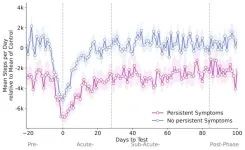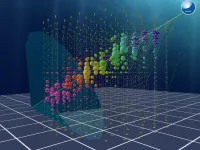(Press-News.org) For the first time scientists have identified promising drug candidates that bind irreversibly with a notoriously “undruggable” cancer protein target, permanently blocking it.
Transcription factors are proteins that act as ‘master switches’ of gene activity and play a key role in cancer development. Attempts over the years to design “small molecule” drugs that block them have been largely unsuccessful, so in recent years scientists have explored using peptides – small protein fragments – to block these “undruggable” targets.
Now researchers from the University of Bath have for the first time detailed an approach to discover peptides that bind selectively and irreversibly within cells, permanently blocking a transcription factor that drives cancer known as cJun.
The team, publishing in the journal Advanced Science, used a new drug discovery screening platform technology, called the Transcription Block Survival (TBS) assay, which tests a huge number of peptides to “switch off” transcription factors that drive cancer.
Their previous work identified reversible inhibitors of cJun, but this latest work builds on that by discovering peptides that bind selectively and irreversibly within cells, permanently blocking cJun action.
The transcription factor cJun has two identical halves, which bind on either side of the DNA strand to alter gene expression.
It can become overactive in cancer, driving uncontrolled cell growth, so the researchers designed a peptide inhibitor that binds to one half of cJun, stopping it from forming pairs and attaching to the DNA.
Once they had made a peptide that bound to the transcription factor, the researchers modified it to bind irreversibly.
Dr Andy Brennan, first author of the study and Research Fellow in the University of Bath's Department of Life Sciences, said: “The inhibitor works a bit like a harpoon that fires across to the target and won’t let go – it grips the cJun tightly and stops it from binding to the DNA.
“We’d previously identified reversible inhibitors but this is the first time we’ve managed to block a transcription factor irreversibly with a peptide inhibitor.”
For the Transcription Block Survival assay, researchers inserted binding sites for cJun, into an essential gene in cells grown in the lab. As cJun binds to the gene, it prevents it working and the cell dies. In contrast, if cJun is blocked by the peptide inhibitor, the gene activity is restored and the cell survives.
Jody Mason, CSO of Revolver Therapeutics and Professor of Biochemistry in the University of Bath's Department of Life Sciences, said: “Many drug candidates that are effective in vitro turn out to be toxic or don’t penetrate cancer cells at all.
“However our platform screens for peptide activity directly in the cell, overcoming many common challenges faced by drugs based on small molecules or antibodies.
“The screen checks the activity of the inhibitor in a real cell environment which includes proteases and other proteins that can sometimes interfere with peptide activity, whilst also checking toxicity.
“We hope this technology can in the future uncover other promising drug candidates for previously ‘undruggable’ targets.”
Having proven cell permeability and activity in cancer cells, as well as target selectivity, the researchers now need to show the inhibitors work in preclinical cancer models.
The research was partly funded by the Medical Research Council and Biotechnology and Biological Sciences Research Council.
END
Researchers identify promising drug candidates for previously “undruggable” cancer target
2025-03-20
ELSE PRESS RELEASES FROM THIS DATE:
Smartwatch data: Study finds early health differences in long COVID patients
2025-03-20
[Vienna, 19.03.2025]—Between April 2020 and December 2022, over 535,000 people in Germany downloaded and activated the Corona Data Donation App (CDA). Of these, more than 120,000 voluntarily shared daily data from their smartwatches and fitness trackers with researchers, providing insights into vital functions such as resting heart rate and step count.
“These high-resolution data served as the starting point for our study,” explains CSH researcher Katharina Ledebur. “We were able to compare vital signs in 15-minute intervals before, during, and after a SARS-CoV-2 infection.”
Higher Resting Heart Rate ...
Mere whiff of penguin poo pushes krill to take frantic evasive action
2025-03-20
Imagine looking at the world through the stalked compound eyes of krill in the Southern Ocean. All of a sudden, a penguin appears like a voracious giant, streamlined like a torpedo, chasing and consuming thousands of krill at rapid speed.
Now, researchers have shown that the water-borne smell of the poo of these flightless birds is enough to cause the krill to show escape behaviors.
“Here we show for the first time that a small amount of penguin guano causes a sudden change in the feeding and swimming behaviors of Antarctic krill,” said Dr Nicole ...
Deep in the Mediterranean, in search of quantum gravity
2025-03-20
Quantum gravity is the missing link between general relativity and quantum mechanics, the yet-to-be-discovered key to a unified theory capable of explaining both the infinitely large and the infinitely small. The solution to this puzzle might lie in the humble neutrino, an elementary particle with no electric charge and almost invisible, as it rarely interacts with matter, passing through everything on our planet without consequences.
For this very reason, neutrinos are difficult to detect. However, in rare cases, ...
Parts of the brain that are needed to remember words identified
2025-03-20
The parts of the brain that are needed to remember words, and how these are affected by a common form of epilepsy, have been identified by a team of neurologists and neurosurgeons at UCL.
The new study, published in Brain Communications, found that shrinkage in the front and side of the brain (prefrontal, temporal and cingulate cortices, and the hippocampus) was linked to difficulty remembering words.
The new discovery highlights how the network that is involved in creating and storing word memories is dispersed throughout the brain.
This is particularly crucial for helping to understand conditions such as epilepsy, in which patients may have difficulty with remembering words. ...
Anti-amyloid drug shows signs of preventing Alzheimer’s dementia
2025-03-20
An experimental drug appears to reduce the risk of Alzheimer’s-related dementia in people destined to develop the disease in their 30s, 40s or 50s, according to the results of a study led by the Knight Family Dominantly Inherited Alzheimer Network-Trials Unit (DIAN-TU), which is based at Washington University School of Medicine in St. Louis. The findings suggest – for the first time in a clinical trial – that early treatment to remove amyloid plaques from the brain many years before symptoms arise can delay the onset of Alzheimer’s dementia.
The study is published March 19 in The Lancet Neurology.
The international study ...
Sharing mealtimes with others linked to better wellbeing
2025-03-20
UCL Press Release
Under embargo until Thursday 20th March, 00:01 UK time / Wednesday 19th March, 20:01 Eastern US time
Not peer reviewed | Literature review & data analysis | People
People who share more mealtimes with others are more likely to report higher levels of life satisfaction and wellbeing, finds research led by a UCL academic for the World Happiness Report.
In chapter three of the report, Sharing Meals with Others, the researchers from UCL, University of Oxford, Harvard University and Gallup found that meal sharing as an indicator ...
New DESI results: Evidence mounts for evolving dark energy
2025-03-19
A new analysis of data collected over three years by the Dark Energy Spectroscopic Instrument (DESI) collaboration provides even stronger evidence than the group’s previous datasets that dark energy, long thought to be a “cosmological constant,” might be evolving over time in unexpected ways.
Dr. Mustapha Ishak-Boushaki, professor of physics at The University of Texas at Dallas, is co-chair of the DESI working group that interprets cosmological survey data gathered by the international collaboration, which includes more than 900 researchers ...
New DESI results strengthen hints that dark energy may evolve
2025-03-19
The fate of the universe hinges on the balance between matter and dark energy: the fundamental ingredient that drives its accelerating expansion. New results from the Dark Energy Spectroscopic Instrument (DESI) collaboration use the largest 3D map of our universe ever made to track dark energy’s influence over the past 11 billion years. Researchers see hints that dark energy, widely thought to be a “cosmological constant,” might be evolving over time in unexpected ways.
DESI is an international experiment with more than 900 researchers from over 70 institutions around the world and is managed by the U.S. Department of Energy’s Lawrence Berkeley ...
DESI opens access to the largest 3D map of the universe yet
2025-03-19
The Dark Energy Spectroscopic Instrument (DESI) is mapping millions of celestial objects to better understand dark energy: the mysterious driver of our universe’s accelerating expansion. Today, the DESI collaboration released a new collection of data for anyone in the world to investigate. The dataset is the largest of its kind, with information on 18.7 million objects: roughly 4 million stars, 13.1 million galaxies, and 1.6 million quasars (extremely bright but distant objects powered by supermassive black holes at their cores).
While the experiment’s ...
New study reveals high levels of fusarium mycotoxins in seized cannabis from Arizona and California
2025-03-19
A recent study conducted by researchers from Arizona State University has uncovered alarming levels of Fusarium mycotoxins in illicit cannabis samples seized in Arizona and California.
The study found that 16% of the 118 samples tested positive for harmful mycotoxins, posing potential health risks to consumers. This groundbreaking research highlights the unregulated and dangerous nature of black-market cannabis.
The study, led by Arizona State University professor Maxwell Leung, analyzed cannabis samples obtained between November 2023 and June 2024 from law enforcement seizures. The samples ...







